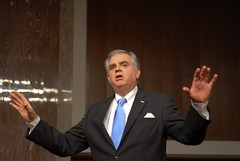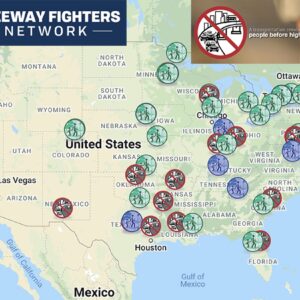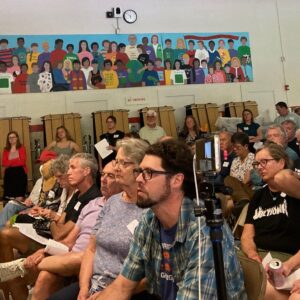
Bike Summit continue to reverberate.
(Photo © J. Maus)
My, what a difference a few years makes.
It was less than three years ago when then US Secretary of Transportation Mary Peters proclaimed that “bike paths” were not a part of transportation infrastructure. Fast forward to early this month when the current DOT chief Ray LaHood issued a strong statement calling for the “end of favoring motorized transportation at the expense of non-motorized.”
With that kind of leadership at the DOT, now the national conversation can finally get real. Case in point is a wide-ranging discussion hosted (live and online) by the weekly political magazine National Journal. The issue was proposed and moderated by National Journal reporter Lisa Caruso.
Caruso asked, “Should bikes and cars be treated equally?” and framed it as both a philosophical and practical (in terms of funding) issue:
“LaHood called the new policy a “sea change,” but is it a good one? Should non-motorized modes of transportation be treated as equal to other modes, particularly when modes like driving and mass transit are at least partially, if not primarily, self-funded? Or is it the essence of DOT’s evolving 21st-century mission to give people more mobility options that, according to LaHood, are relatively fast and inexpensive to build, are environmentally sustainable, reduce travel costs, improve safety and public health, and “reconnect citizens with their communities”?”
Four experts on transportation policy contributed answers on the National Journal blog: Greg Cohen, President and CEO, American Highway Users Alliance; Keith Laughlin, President, Rails-to-Trails Conservancy; Rob Atkinson, President, Information Technology and Innovation Foundation; and Petra Todorovich, Director, America 2050.
All of them but Mr. Cohen from the highway users group were supportive of Sec. LaHood’s statement — but even Cohen did not denounce it outright. He gave a thoughtful and illuminating response.
Cohen disagrees with LaHood’s call for bike-car equality. He points to national polls showing that 72% of Americans feel the federal government should take a “leadership role” in funding major highways and bridges and that only 4% says a similar role should be taken on funding “bicycle paths”. because he feels there’s already not enough money to fund highways and bridges.
In addition, Cohen gets into the funding issue, saying that 14 out of 15 Americans want the gas tax and other “highway user fees” to be spent only “exclusively on roads and bridges.” “I think this indicates that Secretary LaHood’s recent pronouncement is taking federal transportation policy in the wrong direction.”
Even though he disagrees with LaHood, Cohen seems resolved to the fact that bicycles are hear to stay, saying that, “there is and will continue to be a role for bicycle paths in federal transportation policy”. Cohen also calls on “bicycling and motoring communities” to seek common ground.
To do so, Cohen suggests a “federal user fee” program which would take the form of an excise tax on bikes and bike products to “support their programs”. Cohen estimates a 12% excise tax on new bike sales would raise $367.2 million per year.
Cohen also recommends that bicycle advocates “shake off the most radical elements” in their ranks “that demonize the automobile and truck.”
Read Cohen’s full response at NationalJournal.com.
Accompanying this discussion on the National Journal blog is video of a live panel discussion hosted by the Bipartisan Policy Center and moderated by Caruso. It includes Rep. Earl Blumenauer, Sen. Thomas Carper and others. I’ve embedded the video below.





Thanks for reading.
BikePortland has served this community with independent community journalism since 2005. We rely on subscriptions from readers like you to survive. Your financial support is vital in keeping this valuable resource alive and well.
Please subscribe today to strengthen and expand our work.
Big Bro wants to controll everything else, I’m sure they would like to control bicycles as well
Cohen is now on record as being part of the “bike tax!” contingent. Someone needs to call him out on the bit where everyone is already having their tax dollars keep automobile and gas prices artificially low.
If he wants “common ground”, he needs to stop telling me how I’m not paying enough for my own ride when I’m already paying a disproportionate amount towards those of others.
I think as long as we are taxing fuel for funds to create transportation infrastructure, we will always encounter the attitude that human-powered vehicles don’t belong. The way we currently fund transportation just doesn’t make sense anymore.
And I hate when people talk about “bike paths.” I’ve been riding a bike for about 50 years now (not exclusively, I’ve been driving, and buying gas, for 40 years), and I don’t think I’ve ever encountered a path that was intended just for bikes. I’ve ridden on plenty of Multiple-Use-Paths, though. But the public’s perception is that we are taking money from auto transportation funds to build paths just for bikes, not for non-motorized travel.
Whatever they’re smokin’, they should share:
“Should non-motorized modes of transportation be treated as equal to other modes, particularly when modes like driving and mass transit are at least partially, if not primarily, self-funded? ”
Self-funded? In what dream-land does that happen? Extremely partially self-funded by the slimmest of percentages, maybe, but definitely in no way primarily.
I would like to see a clear, graphic presentation of how roads are funded. I’d like it to have a related pair of graphics showing what part of the roads I fund by buying gas, and what part I STILL fund if I never use gas at all.
I’d like it to show clearly the cost of road damage that a (say, small sedan) car creates per mile driven, versus the cost of damage my bike creates per mile ridden.
I’d like all of this on a single, vivid web page, with hyperlinked data sources, that I could show to EVERY DAMN WHINER who makes the stupid “fair share” argument, including the supposedly well-informed Cohen.
Is there such a thing? Could there BE such a thing? It would be an excellent thing.
Cohen also recommends that bicycle advocates “shake off the most radical elements” in their ranks “that demonize the automobile and truck.”
You first.
@#3: Except that the fuel tax doesn’t even cover 50% of the maintenance costs and doesn’t even begin to touch building new infrastructure.
I worry a little about discussions that focus on “equality for bikes”.
Over the past 100 years We have designed a ladnscape of, by and for the autombile. Asking people to see cars and bikes as equalNOW denies the inequality inherent in the enterprise, the inequality that comes from an insistence on making bicyclists and car drivers share the same roads. How on earth is this truly possible in a equitable — and SAFE — manner? Differences in size, vehicle speeds and user vulnerability make such sharing nearly impossible.
Since we cannot tear down the landscape wholesale, the best we can do for now is to make provisions for safe passage by people on bicycles.
Making provision is a different idea than making all vehicles equal. It recognizes the differences between automobiles and bicycles and creates laws to protect the more vulnerable road-user in the short term. This approach saves lives while giving governments — and socieities — the decades, the GENERATIONS of time needed to redesign our urban landscapes.
What we are ultimately talking about IS a shift AWAY FROM automobile dependence, a shift that will take generations because it goes hand in hand with other paradigm shifts that will and must happen concurrently — including smaller and more local economies of scale, cooperative housing arrangements and the deemphasizing of a consumer-based economy. The car will become demonized by default for future generations, even as we take great pains not to piss off the automotive majority today.
Yeah, I disagree with Cohen – gas taxes and other user fees for automobiles would more properly be spent on reducing the effects of the damage they cause. So that money should be spent on alternative transportation, transit, and dealing with the health impact on those who live along expressways and major arterials – if there is excess it should be spent on the major roads, which are most heavily used and damaged by motorized vehicles (especially large trucks). Income tax should pay for the roads and bridges, because they are (and should be) used by all modes of travel. In addition, all new road/bridge construction, repaving and repair projects should REQUIRE updating the facilities to handle pedestrians and human-powered transportation.
and “primarily self-funded”? We already know that’s not true for cars, and I’m pretty sure that’s not true for most transit agencies – Tri-Met’s user fees make up something like 40% of their budget, the majority provided by employer taxes.
“Bike paths” my butt! The road is my path. We all paid for it. Make room.
It’s not equality for bikes, it’s equality for cyclists.
cars and bikes are simply inanimate objects, it’s the motorists and cyclists who operate them who count.
When Cohen is quoting polls to make his point he should be aware of how these polls are taken.
The survey companies pay employees on commission. Employees will do just about anything to keep someone on the line while they randomly answer yes or no.
Long, long ago I worked at 3 different survey places. Yeah, I was very broke at random points in my life. I did surveys for a zillion politicians, causes, agendas, etc…. just like this. Hands down they were all biased and slanted questions not very well hidden in the dialogue.
Many of these kind of surveys literally start out “are you republican or democrat”, if you answer wrong the surveyor says “have a nice night”. How is that for a balanced poll.
Mr. Cohen should be aware that there is a very good chance his statistics were derived from something like this.
@Paul Johnson #7
I know! That’s why our current funding system doesn’t make sense. Autos are transitioning to electric, so gas tax doesn’t collect from them. Yet they have the same needs as gasoline-powered vehicles.
We need to come up with an entirely new way of funding transportation. One that is equitable and inclusive of all modes of travel. A gas tax ain’t it. But I think it gives those that feel they are (in their minds) paying for the system a feeling of entitlement. And that fosters the car-centric nature of our transportation system.
Divide and conquer.
Bent Bloke: I’m not in favor of cyclists paying any fees until motorists have made up for lost time. Assuming motorists had to start paying their way today, I would support fees for cyclists starting in 2075.
“leadership role”
What does that mean in context of a survey. When you think of the interstate I think most people think of funding, when talking about bicycle infrastructure I think most people think of planning, not funding.
Similarly
“93% of likely voters felt it was important that their elected officials support dedicating the fuel tax and other highway user exclusively to roads and bridges”
It depends on how the survey defines “road and bridges”.